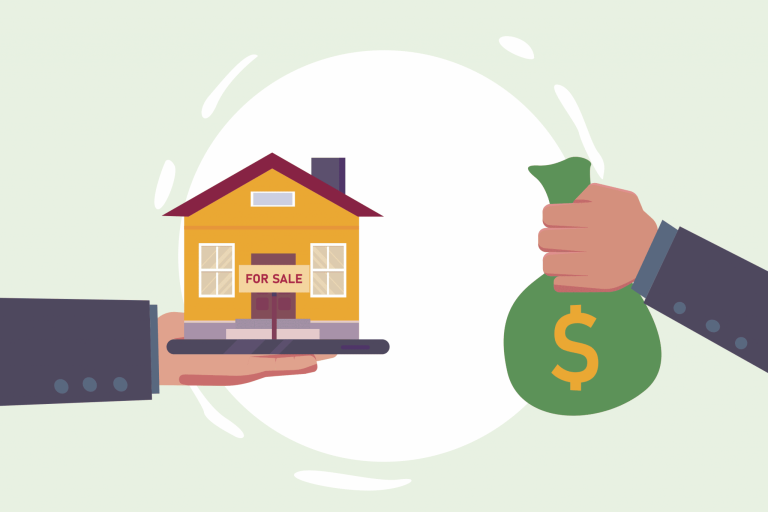Key Takeaways:
- A “cash offer” means the buyer isn’t relying on a mortgage. They have funds ready to use.
- Cash deals often close faster (7–30 days) and carry fewer contingencies.
- Cash offers may be lower, since buyers assume more risk.
- Verify legitimacy: a true cash buyer uses title companies, inspections, and transparent processes.
- Cash offers suit sellers who need speed or have homes in less-than-perfect condition.
Table of Contents

What's classified as a cash offer on a house?
In today’s world of credit cards and digital payments, you may wonder what a cash offer really means. Simply put, it creates a direct line of negotiation between you and the buyer.
A cash buyer isn’t reliant on a mortgage. This means neither of you has to wait for bank approval. The result is smoother communication and a higher chance of closing the deal successfully.
Cash offers also speed things up. In some cases, buyers can make an offer in as little as 24 hours. The process becomes quick and relatively free of conditions.
Does a cash offer literally mean cash?
No, receiving a cash offer doesn’t mean a buyer will show up with a briefcase full of money. It simply means the buyer has funds readily available. Most people can’t afford to pay for a home all at once, so the majority rely on a mortgage. In fact, in 2018, about 78% of buyers used one.
While mortgages make homeownership possible, they can also slow down the buying and selling process. Banks have their own financial interests to protect, so buyers who need financing must wait on the bank’s approval.
How is an offer based on a mortgage different?
There are several key differences between a mortgage and a cash offer:
- Timeline – A mortgage sale typically takes 30–60 days, while a cash offer can close in as little as 7–30 days.
- Approval – Mortgages require bank approval; cash offers depend solely on the buyer’s liquid assets.
- Fees – Mortgage lenders often collect commission fees, which can affect the buyer’s offer. Cash offers involve only the buyer.
- Eligibility – With a mortgage, the bank determines whether the buyer qualifies. With cash offers, the buyer must prove their eligibility directly to you.
- Availability – Most buyers need mortgages, so cash offers are less common.
- Closing Costs – Mortgage sales usually include closing costs, while cash deals may reduce or simplify them.
Who makes cash offers?
Individuals who recently sold their home at a profit may be able to make a cash offer on yours. While some buyers use cash for a permanent home, many cash offers actually come from investors.
Investors are typically ready to buy as-is because they plan to renovate and eventually resell. This makes them especially interested in homes that need repairs or updates you may not want to tackle yourself. If you think your property might be a good fit, you can reach out to investors instead of waiting for them to find you.
Both traditional buyers and investors offer different advantages, so the right choice depends on your needs as a seller.
Are there downsides to a cash offer?
As with most things in life, a cash offer isn’t completely free of drawbacks. Fortunately for sellers, most of the challenges fall on the buyer.
For example, a cash buyer purchasing for personal use must decide whether to tie up most of their savings in a home or reserve funds for future needs. If they commit too much, they could struggle to cover unexpected expenses later.
Buyers also take on more responsibility to prove they can afford the property. This is especially true for individuals purchasing a home for themselves. However, many cash buyers are actually investors.
Investors often look for properties with potential—homes needing repairs or updates—and usually have the resources to complete the deal. For this article, the focus is on investors rather than personal-use buyers.
As a seller, you have fewer concerns with cash offers. Still, one key step is confirming the buyer truly has the funds. A title company typically handles this process, which we’ll cover later.
Another factor to keep in mind is that cash buyers—especially investors—often make lower offers. Since they’re paying upfront, they base their price strictly on available funds and the condition of the property.

Should you accept a cash offer?
Naturally, this decision is ultimately up to you.
One key factor to consider is how quickly you want the process completed. A buyer who needs a mortgage will likely take much longer to close the deal than one making a cash offer. Because the timeline is longer and a bank is involved, a mortgage buyer is also more likely to back out.
A cash buyer could still walk away, but it’s less likely. They typically do their research upfront before making an offer. Mortgage buyers, on the other hand, may be less certain about what they can truly afford when negotiations begin.
Another consideration is the price. Cash offers are often lower, though not always. Investors in particular may base their offer strictly on available funds and the property’s condition.
You’ll also want to weigh speed versus payout. It’s common to receive less money with a cash offer than with a mortgage. However, the process is usually much faster. The real question becomes: do you need to sell quickly, or do you want to maximize your return? In some cases, you may get both—but it’s not guaranteed.
When is a cash offer not legitimate?
Many people are wary of cash offers—and not without reason. While having endless information at our fingertips is usually helpful, it sometimes falls into the wrong hands.
Think about those scam calls claiming your social security number has been canceled or your warranty is expiring. You block numbers, yet scammers always find a way to reach you. Over time, seeing “Scam Likely” feels like an invasion of privacy and a drain on your time.
Because of these scams, it’s understandable to be cautious when someone contacts you out of the blue about your home. Still, ignoring every cash offer could mean missing out on the perfect buyer.
Here are a few red flags that someone may be trying to scam you:
1. The cash buyer does not use a title company.
Using a title company is one of the most important indicators of a trustworthy cash buyer. A title company acts as a neutral third party between the buyer and seller. Its purpose is to ensure both parties have the proper rights to complete the deal.
Just like a car title, a house title proves ownership. According to Legal Match, there are four main types of real estate titles:
- Fee Simple – Full ownership of the property by one individual.
- Joint Tenancy – Two or more people share ownership, with “right of survivorship.” If one person dies, the other(s) inherit full ownership.
- Tenancy in Common – Two or more people own the property, but without survivorship rights.
- Tenancy in the Entirety – Ownership shared through marriage.
Understanding these types of titles is essential when selling your home. For example, if a daughter inherits property under a joint tenancy with her sister, she cannot sell the house alone. Both must agree and accept the offer together. This is why a legitimate cash buyer uses a title company for a title search—to verify the seller’s full right to sell.
Protecting the Buyer
Sometimes, a seller inherits debt on a home and tries to sell it for less than what is owed on the property. Without a title search, the buyer could unknowingly inherit that debt. This is one of the key risks a title company prevents.
The title company also provides title insurance, usually paid for by the buyer. This protects both parties. For example, it may reveal issues with ownership that the seller didn’t even know about.
Protecting the Seller
A title company verifies the buyer’s legitimacy by only accepting cashier’s checks or wire transfers. It will never accept physical cash because it cannot be traced. Here’s how the process typically works:
- The buyer pays the title company to conduct a title search.
- The title company verifies ownership rights and the legitimacy of the ownership chain.
- It prepares the new deed and documentation for county records.
- The buyer sends funds via wire transfer or cashier’s check.
- Once the money is received, the seller gets paid and the deed is transferred.
Without a title company, a buyer may try to gain control of your property without paying. A title company ensures financial legitimacy and protects both sides.
Avoiding Quitclaim Deeds
Some sellers try to use a quitclaim deed instead of a warranty deed. A quitclaim deed bypasses the title search, which greatly increases risk. There’s no guarantee the seller has full ownership of the property.
A real cash buyer will avoid quitclaim deeds for this reason. If someone suggests this route, it’s a red flag. The safer, preferred method is always a warranty deed through a title company.
2. The cash buyer does not ask more about your home.
If a cash buyer is willing to buy your house without knowing the details, it’s likely shady. A legitimate cash buyer will want to know the condition of the roof, electrical, HVAC, plumbing, square footage, number of bedrooms and bathrooms, and how old the house is. While some of this information may be found online, particularly if the house has been listed in the past, a real cash buyer will still need more information from you. If they try to buy it without seeing your home or knowing any of these details your inner alarm should be ringing loudly. This is particularly true if they seem to be rushing through the process.
3. The cash buyer does not have the house inspected.
Related to the point above, a real cash buyer needs to know that your house is worth buying. Often, the homes that are bought for cash need a lot of work and this is why they aren’t listed with a realtor. While a cash buyer knows this going in, they will need to know the entire condition of the house before they can buy.
Here are a few things house inspectors assess the condition of:
- The foundation
- The roof and walls
- The heating and cooling systems
- The floors, ceilings, and windows
- The plumbing
- The electrical and wiring
Each of these components is essential to determining the worth of your house which is why a legitimate cash buyer will go through an inspection. An inspection can take two to three hours. This is an important step for the seller too because you can be present with the inspector during the process. This allows you to see what the inspection results are and how the inspector got them. Someone who is trying to pull a fast one on you is not going to want to dish out money for an inspection.
You may be thinking “Well if the cash buyer asked me about all of these things already why do they need an inspection?” This is the way the cash buyer knows that the information you present is reliable. While people may have some issues with their house that they are unaware of, such as structural or electrical issues, some may try to purposely leave out important details.
Perhaps you have noticed a theme here in our list. A real cash buyer is going to take a number of steps to make sure the deal is a viable option for both you and them. This is seen in the use of a title company and inspector. If a cash buyer seems to be working without such screenings, then they may not be the most trustworthy. Or, at the very least, they may not be taking the necessary steps to ensure that you and they both are protected in the deal.
4. The cash buyer withholds information.
A legitimate buyer will be fully open with you during the process about their procedures and end goal. They should communicate with you throughout and always be willing to answer your questions. If a cash buyer seems to be beating around the bush or simply glazes over things, this may be a red flag. The cash buyer should also be open to talking about their business and past work. If the buyer is nowhere to be found online, then it is less likely they are legitimate.
5. The cash buyer has no references.
When you ask about other deals they’ve made and where you can find reviews and they fall silent or change the subject, something is probably not right. Either they do have previous clients and the reviews are poor or they do not have any real references.
6. The cash buyer asks you to pay for closing costs.
One of the benefits of cash buyers is that they almost always pay for your closing costs. While some real cash buyers may not, the majority do. Closing costs may include the following:
- Title Search
- Title Insurance
- Appraisal Fees
- Survey Fee
- Taxes
It is estimated that the average closing cost in the U.S. is $5,749. This is no small amount, so discuss closing fees early on so there are no surprises.

What does not automatically qualify as a scam?
Now that you know the warning signs, here are some things that do NOT necessarily indicate the person/business is trying to scam you:
1. They call or text you first.
This is known as cold calling. It’s a common marketing strategy where businesses reach out to potential leads instead of waiting for people to find them.
Because many of us have been conditioned to distrust unknown numbers, it’s easy to assume every call or text is a scam. While scams do exist, many legitimate businesses also use cold calling.
If someone reaches out, it’s worth learning a little more before assuming the worst—especially if you’re interested in selling. That said, never share personal details like your social security number or bank account information unless you’re sure the business is legitimate.
2. They ask about your house even if it’s not listed.
This may feel suspicious at first, but it’s common for investors. They often look for properties that are vacant, abandoned, or in poor condition—homes unlikely to sell well on the open market.
Investors may contact you if:
- You own a vacant or abandoned property.
- You started renovations but can’t finish them.
- You inherited a home that needs work and isn’t being lived in.
These properties may not appeal to realtors but are a perfect fit for investors. If you’re not interested in selling, a simple “no” is all you need to give.
3. The buyer is a wholesaler.
Some claim all wholesalers are scammers, but that’s not true. Wholesaling works like this: a cash buyer finds a property, completes the inspection and title search, then sells the contract to another buyer who will handle renovations.
This process can help your house sell faster than waiting for the right fix-and-flip buyer to come along. If you’d rather sell directly to the renovator, you can—but it may take more time and effort.
The Bottom Line
Only do business with someone you trust. If you don’t trust them, the process will feel stressful even if they’re legitimate.
Keep in mind, the scenarios above don’t automatically signal a scam. Real estate beyond traditional realtors can feel unfamiliar, so it’s natural to be cautious. Still, if you need to sell your house as-is, a cash buyer may be your best option.
Not all cash buyers are created equal
As with most things in life, not all cash buyers are the same. Legitimacy exists on a spectrum rather than a simple yes or no. Some buyers can close deals but use questionable tactics. Others are outright scammers with no intention of following through. The best cash buyers are transparent, established, and keep their commitments.
A good cash buyer should aim for mutually beneficial deals. If the arrangement feels one-sided—where the buyer gets all the benefits—it’s better to walk away.
They should never try to trap or trick you. Instead, they should be honest, flexible, and attentive to your needs. Their integrity should be clear in how they communicate, their mission statement, and their business practices. A buyer with true integrity will even tell you if you’re better off pursuing another option. This is what separates reputable buyers from “sharks.”
If a cash buyer dismisses your concerns without addressing them, that’s a red flag.
Cash Buyers vs. Mortgage Buyers
Both cash buyers and mortgage buyers can be great options, depending on your situation. Realtors can also guide you to strong deals. But cash buyers may be especially helpful when your home is harder to sell through traditional methods.
The key is to research your options, talk to multiple people, and make an informed decision based on your needs.
When a Cash Offer May Be Best
- You need to sell quickly.
- You need to sell as-is.
- You have a vacant or abandoned property.
- Efficiency is more important than maximum profit.
When a Cash Offer May Not Be Best
- Your house is in great condition.
- You care more about profit than speed.
- You want to sell at the highest possible price.
You should never feel pressured into a deal. The best outcome is one where everyone wins. In the end, it’s your decision to choose the option that fits you best. Happy house selling!



